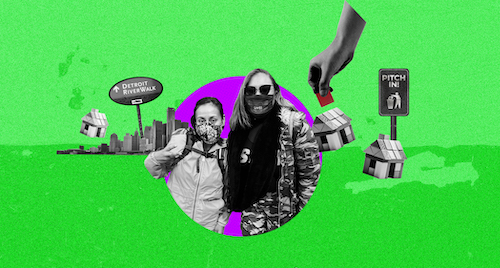
When Alexcia Starks looks out her window, she can see the remains of a burnt Craftsman-style house. Two doors down from where she lives in southwest Detroit, there’s another attractive 1920s home that suffered the same fate.
“The one across the street happened last year. I knew the man who lived there,” Starks says with her voice trailing off. Then, possibly looking to focus on the positive, her voice becomes stronger when she shares that both homes were recently bought and someone was renovating them.
“When I was younger, I wondered why blight would just sit there. Now I understand that it’s not like your concern goes straight to the mayor. There are many steps in making something happen in your neighborhood. It’s just how it is. And it really does start with one person looking to make a change — that person could be you.”
At only 18 years old, the freshman sociology major is aware that she can play a role in making her Detroit neighborhood a more attractive, sustainable, socially just place to live. To help her better understand how to do that, she’s working as an intern for Councilwoman Raquel Castañeda-López office with the Building Better Blocks program.
Starks learned of the internship when she let faculty members who teach sociology know of her interest in helping re-shape Detroit neighborhoods. In addition to sharing the opportunity with Starks, she says professors also helped her polish her resume and prepped her for the interview. Starks says she’s also getting college credit for her experience.
Starks — whose photo with Castañeda-López is on the September cover of Detroit’s District Six newsletter — says her internship is partially in person and virtual. On weekends, she does tours of Detroit neighborhoods and businesses. And last Saturday, she spent time helping plan a playground in a field where Pattengill Elementary School used to be.
“I really want to get in touch with Detroit communities, meet the people around me and find out what they need. I also want to really surround myself with stories from the people who have lived here so I can understand Detroit’s history. When I was in Detroit schools, they didn’t teach me Detroit history — and our city over 300 years old. Isn’t that something? I want to know more about Detroit and where it’s been so I can better understand where we want to go.”
Starks says she doesn’t have political ambitions, but she does want to help her neighbors by better understanding the political systems in play, learning why decisions are made, and figuring out how she may be able to navigate policy and procedures in the future.
And it’s something she started before she could drive. At age 15, Starks volunteered for Mayor Mike Duggan’s re-election campaign. Starks went door-to-door canvassing Detroit neighborhoods to let them know about the 2017 election. Most of it was on foot and she says she enjoyed interacting with people in neighborhoods across the city and seeing the multicultural fabric of Detroit.
“It was so wonderful going out to neighborhoods I haven’t spent time in before. I was helping people learn what was on the ballot and reminding them to vote,” she says. “It was a learning experience for me too. I met so many people and was able to ask questions about Mayor Duggan’s strategy. I didn’t get why Detroit’s downtown businesses got so much attention, while the neighborhoods seemed left out. This gave me the chance to talk with someone about it.” She was told Duggan’s plan is to have a strong downtown whose success radiates out to the neighborhoods.
But until that’s fully realized, Starks says there is work to do.
Eventually, she hopes her collective experience will lead to a human rights career where she can work as a Detroit-based immigration attorney. She’s already working on learning other languages; she credits that interest to her Haitian grandmother, who is a translator. Starks says she’s looking forward to additional experiences in college that will help expand her understanding of the social and political systems that we live within.
Starks says she’ll continue to combine her academics with on-the-ground experience like she’s gaining through Castañeda-López’ office because there is still blight to remove, people who need connections to resources and playgrounds to build.
“It really is about showing up. Caring for the people is what building better neighborhoods is all about.”



